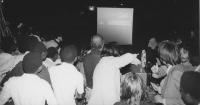 The solo exhibition ‘Monuments in Reverse’ gathers for the first time a set of works by Ângela Ferreira, made between 2008 and 2012, which emerged from the same research-based processes, giving rise, however, to disparate installations whose intimate relationships tend to remain unexplored from a curatorial perspective. With the aim of opening a space of visibility for the conceptual and formal interstices sustaining her practice in general and these works in particular, the exhibition is purposefully documentary and process-based. It intends to shed light on thinking processes more than points of arrival, through the possibility of new connections, or the visibility of previously occluded ones, the strong presence of drawing and video, and the dialogue with works by others which have constituted point of departure or inspiration.
The solo exhibition ‘Monuments in Reverse’ gathers for the first time a set of works by Ângela Ferreira, made between 2008 and 2012, which emerged from the same research-based processes, giving rise, however, to disparate installations whose intimate relationships tend to remain unexplored from a curatorial perspective. With the aim of opening a space of visibility for the conceptual and formal interstices sustaining her practice in general and these works in particular, the exhibition is purposefully documentary and process-based. It intends to shed light on thinking processes more than points of arrival, through the possibility of new connections, or the visibility of previously occluded ones, the strong presence of drawing and video, and the dialogue with works by others which have constituted point of departure or inspiration.
07.01.2015 | by Ana Balona de Oliveira
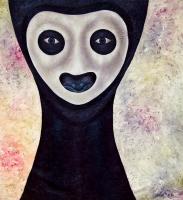 We know that racism is the social, cultural and political result of eurocentrism, which created the need to mark, distinguish and separate racialized ethnic groups of the human community, on the basis of skin color and/or culture. The main leverage associated with this dehumanizing enterprise of racialized ethnic groups was set on the power to construct myths that have always justified racism. In that regard, far from constituting a mere repository of unconscious and harmless prejudices, as it is often made believe, the analysis of the political situation, with the strengthening of fascism and the rise of the far right in Europe, demonstrates that racism remains at the junction of contemporary institutional political practices and the slavocratic, imperial and colonial ideologies.
We know that racism is the social, cultural and political result of eurocentrism, which created the need to mark, distinguish and separate racialized ethnic groups of the human community, on the basis of skin color and/or culture. The main leverage associated with this dehumanizing enterprise of racialized ethnic groups was set on the power to construct myths that have always justified racism. In that regard, far from constituting a mere repository of unconscious and harmless prejudices, as it is often made believe, the analysis of the political situation, with the strengthening of fascism and the rise of the far right in Europe, demonstrates that racism remains at the junction of contemporary institutional political practices and the slavocratic, imperial and colonial ideologies.
29.12.2014 | by Mamadou Ba
 Breyten Breytenbach is a distinguished poet, painter, novelist, playwright, essayist and human rights activist. He is considered one of the greatest living poets in Afrikaans. His literary work has been translated into many languages and he has been honoured with numerous literary and art awards. Having exhibited worldwide he is also a recognized painter, portraying surreal imagery. He was born on 16 September 1939 in Bonnievale and studied art at the Michaelis Art School in Cape Town.
Breyten Breytenbach is a distinguished poet, painter, novelist, playwright, essayist and human rights activist. He is considered one of the greatest living poets in Afrikaans. His literary work has been translated into many languages and he has been honoured with numerous literary and art awards. Having exhibited worldwide he is also a recognized painter, portraying surreal imagery. He was born on 16 September 1939 in Bonnievale and studied art at the Michaelis Art School in Cape Town.
27.08.2014 | by Breyten Breytenbach
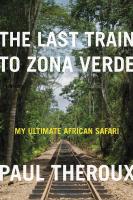 He dares refer to Angola as ‘pretty much terra incognita’ and even as a country in ‘isolation’. These descriptions are unfathomable when you consider even a basic historical listing that might take in the arrival of the Portuguese in the fifteenth century, the onward creep of Christianity, the trans-Atlantic slave trade, Portuguese colonialism, the proxy Cold War, the international oil and diamond industries, and more recently the influx of the Chinese, not to mention Angola’s major financial investments in Portugal and the explosion of kuduro music across the globe. Even at the micro level, there are plenty of Angolans who live in Luanda’s musseques, but travel across the globe to buy clothes, soft furnishings and mobile phones to sell back home. Isolated? I think not. Unknown to parochial North Americans? No doubt.
He dares refer to Angola as ‘pretty much terra incognita’ and even as a country in ‘isolation’. These descriptions are unfathomable when you consider even a basic historical listing that might take in the arrival of the Portuguese in the fifteenth century, the onward creep of Christianity, the trans-Atlantic slave trade, Portuguese colonialism, the proxy Cold War, the international oil and diamond industries, and more recently the influx of the Chinese, not to mention Angola’s major financial investments in Portugal and the explosion of kuduro music across the globe. Even at the micro level, there are plenty of Angolans who live in Luanda’s musseques, but travel across the globe to buy clothes, soft furnishings and mobile phones to sell back home. Isolated? I think not. Unknown to parochial North Americans? No doubt.
12.10.2013 | by Lara Pawson
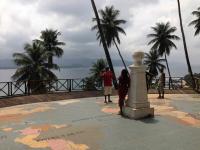 I will begin by reviewing two contrastive approaches in the anthropological and neighboring literatures on Latin America: the postcolonial and the multiple modernities perspectives. It then discusses the possible place(s) of Brazilian classic nation-building literature in these debates, putting forth an argument for the need for substantial historical embedding when addressing the postcolonial in relation to Brazil. It concludes with remarks based on ongoing ethnographic research about contemporary South-South cooperation between Brazil and the African continent.
I will begin by reviewing two contrastive approaches in the anthropological and neighboring literatures on Latin America: the postcolonial and the multiple modernities perspectives. It then discusses the possible place(s) of Brazilian classic nation-building literature in these debates, putting forth an argument for the need for substantial historical embedding when addressing the postcolonial in relation to Brazil. It concludes with remarks based on ongoing ethnographic research about contemporary South-South cooperation between Brazil and the African continent.
11.10.2013 | by Letícia Cesarino
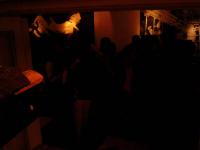 Latin American intellectuals have been in the forefront of doing mestiçage, métissage, Anthropophagy. While we certainly consider ourselves as part of Postcolonial theory, we have also critiqued certain of its aspects, for example the ahistorical, uncritical celebration of hybridity discourse. We were asking: “What are the genealogies of such discourses?” We prefer to emphasize the question of “linked analogies” between and across national borders. So for us, cross-border analysis becomes really crucial. It is not reducible to nation-state formations.
Latin American intellectuals have been in the forefront of doing mestiçage, métissage, Anthropophagy. While we certainly consider ourselves as part of Postcolonial theory, we have also critiqued certain of its aspects, for example the ahistorical, uncritical celebration of hybridity discourse. We were asking: “What are the genealogies of such discourses?” We prefer to emphasize the question of “linked analogies” between and across national borders. So for us, cross-border analysis becomes really crucial. It is not reducible to nation-state formations.
01.10.2013 | by Emanuelle Santos and Patricia Schor
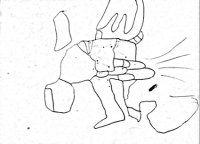 I read with attention the news of the arrival of more and more emigrants to the "shores of Europe" (which should their Europe be? In which window would they have drawn it in backlight?); I realize their presence in this Europe I live in, I feel the law enforcement and the construction of detention camps to accommodate them, society changing with their presence, my presence changing with their presence, Lisbon becoming a European capital, me becoming a Europe I don't want to be.
I read with attention the news of the arrival of more and more emigrants to the "shores of Europe" (which should their Europe be? In which window would they have drawn it in backlight?); I realize their presence in this Europe I live in, I feel the law enforcement and the construction of detention camps to accommodate them, society changing with their presence, my presence changing with their presence, Lisbon becoming a European capital, me becoming a Europe I don't want to be.
26.05.2013 | by Ana Bigotte Vieira
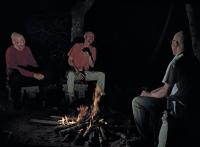 We asked an albino guy if he could tell any jokes about the Portuguese, he laughed and said, a Portuguese man arrived here in Maputo, couldn’t believe his eyes, and asked a smart and friendly looking native what they called motherfuckers in Mozambique. But sir, we don’t call them, they come from Lisbon of their own accord. And there we were, two motherfuckers in Maputo, 38 years after independence and 20 years after the civil war, the old drunk woman shouting, her eyes irradiating blood and misery, give me a mulatto, give me a mulatto or money, motherfucker.
We asked an albino guy if he could tell any jokes about the Portuguese, he laughed and said, a Portuguese man arrived here in Maputo, couldn’t believe his eyes, and asked a smart and friendly looking native what they called motherfuckers in Mozambique. But sir, we don’t call them, they come from Lisbon of their own accord. And there we were, two motherfuckers in Maputo, 38 years after independence and 20 years after the civil war, the old drunk woman shouting, her eyes irradiating blood and misery, give me a mulatto, give me a mulatto or money, motherfucker.
24.04.2013 | by João Maria Gusmao + Pedro Paiva
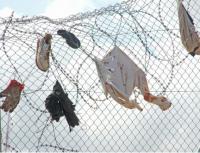 When an "illegal" manage to reach Ceuta, he has to go to the police station. There, he is recorded as having no papers, and it’s left to local authorities to decide what to do with him: it can vary between deportation and receiving a provisional document, which allows the individual to move into the European territory (without, however, having documents allowing him to sign an employment contract). At the door of the police stations, Civil Guard elements often prevent the immigrants to submit to the authorities, handing them to Moroccan militaries.
When an "illegal" manage to reach Ceuta, he has to go to the police station. There, he is recorded as having no papers, and it’s left to local authorities to decide what to do with him: it can vary between deportation and receiving a provisional document, which allows the individual to move into the European territory (without, however, having documents allowing him to sign an employment contract). At the door of the police stations, Civil Guard elements often prevent the immigrants to submit to the authorities, handing them to Moroccan militaries.
14.04.2013 | by Ana Bigotte Vieira and Hugo Maia
 The question is rather something else: What about other thinkers who operate outside this European philosophical pedigree, whether they practice their thinking in the European languages they have colonially inherited or else in their own mother tongues - in Asia, in Africa, in Latin America, thinkers that have actually earned the dignity of a name, and perhaps even the pedigree of a "public intellectual" not too dissimilar to Hannah Arendt, Jean-Paul Sartre, and Michel Foucault that in this piece on Al Jazeera are offered as predecessors of Zizek?
The question is rather something else: What about other thinkers who operate outside this European philosophical pedigree, whether they practice their thinking in the European languages they have colonially inherited or else in their own mother tongues - in Asia, in Africa, in Latin America, thinkers that have actually earned the dignity of a name, and perhaps even the pedigree of a "public intellectual" not too dissimilar to Hannah Arendt, Jean-Paul Sartre, and Michel Foucault that in this piece on Al Jazeera are offered as predecessors of Zizek?
17.01.2013 | by Hamid Dabashi
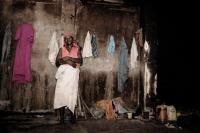 The "resource curse" is a term used to characterize the risks faced by poor countries where natural resources that are object of international greed are discovered. The promise of abundance arising from the enormous commercial value of resources and from the investments required to achieve it is so convincing that it starts to influence the pattern of economic, social, political, and cultural development.
The "resource curse" is a term used to characterize the risks faced by poor countries where natural resources that are object of international greed are discovered. The promise of abundance arising from the enormous commercial value of resources and from the investments required to achieve it is so convincing that it starts to influence the pattern of economic, social, political, and cultural development.
06.12.2012 | by Boaventura de Sousa Santos
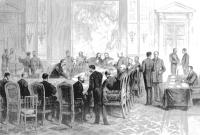 Thus, far from being characteristic of colonial continuities before former European colonies - or what the Peruvian Anibal Quijano (1992) dubbed coloniality of power and knowledge, we are witnessing an Israeli colonialism that, contrary to what is preached is not based on defense and state security before the neighbors and "enemies" in Arabic or enlargement of its territory, but the regional dominance of a natural resource more precious than oil and that can feed the emergence of new colonial regimes in XXI Century: Water.
Thus, far from being characteristic of colonial continuities before former European colonies - or what the Peruvian Anibal Quijano (1992) dubbed coloniality of power and knowledge, we are witnessing an Israeli colonialism that, contrary to what is preached is not based on defense and state security before the neighbors and "enemies" in Arabic or enlargement of its territory, but the regional dominance of a natural resource more precious than oil and that can feed the emergence of new colonial regimes in XXI Century: Water.
20.11.2012 | by Odair Bartolomeu Varela
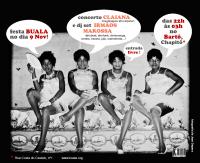 Thinking about the body is a strategic requirement, a way to discuss the normative processes of exclusion, naturalization and production, setting new ways to be in the world, new affections, to expand the horizon of the reasoning about the body. The idea is to insist less in the identity politics nor the identity pretensions (and its deceiver subversion) and more on precariousness and the way it deals with difference as well as the way the maps of power are exploited.
Thinking about the body is a strategic requirement, a way to discuss the normative processes of exclusion, naturalization and production, setting new ways to be in the world, new affections, to expand the horizon of the reasoning about the body. The idea is to insist less in the identity politics nor the identity pretensions (and its deceiver subversion) and more on precariousness and the way it deals with difference as well as the way the maps of power are exploited.
06.11.2012 | by Buala
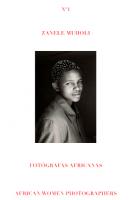 The African continent for a long time was totally overlooked in the annals of the history of photography. Indeed, Africa only appeared timidly on the international horizon or rather to arouse certain interest in the West around the early 1990s. Among other important events of the time that contributed towards this growing interest figures the African Photography Biennial in Mali, also known as the African Encounters of Photography. It was precisely that framework that gave rise to this collection that wishes to concentrate on the gaze of some of the women participating in the biennial. Our collection has two main objectives: firstly, to forestage African photography on the global scenario, in other words, to make it part of the whole and not merely consider it as part of the rest; and, secondly, to act out the will to endow African women photographers more visibility. This collection aims to break down the barriers of this double invisibility by looking at the narrative constructs of these women and thus multiplying the existing ways of seeing in an attempt to broaden and enhance our own perspectives.
The African continent for a long time was totally overlooked in the annals of the history of photography. Indeed, Africa only appeared timidly on the international horizon or rather to arouse certain interest in the West around the early 1990s. Among other important events of the time that contributed towards this growing interest figures the African Photography Biennial in Mali, also known as the African Encounters of Photography. It was precisely that framework that gave rise to this collection that wishes to concentrate on the gaze of some of the women participating in the biennial. Our collection has two main objectives: firstly, to forestage African photography on the global scenario, in other words, to make it part of the whole and not merely consider it as part of the rest; and, secondly, to act out the will to endow African women photographers more visibility. This collection aims to break down the barriers of this double invisibility by looking at the narrative constructs of these women and thus multiplying the existing ways of seeing in an attempt to broaden and enhance our own perspectives.
24.09.2012 | by Masasam
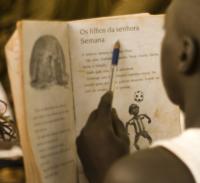 The creole, as a language, arose from the communication needs of colonized societies with the colonizer regime, being the language of national unity in many countries. Considering their own mother tongues as little useful, colonized societies recurred to the linguistic knowledge of the imposed model to build a simpler form of vehicular language, which we nowadays call creole.
The creole, as a language, arose from the communication needs of colonized societies with the colonizer regime, being the language of national unity in many countries. Considering their own mother tongues as little useful, colonized societies recurred to the linguistic knowledge of the imposed model to build a simpler form of vehicular language, which we nowadays call creole.
23.08.2012 | by Catarina Laranjeiro and Jorge Filipe
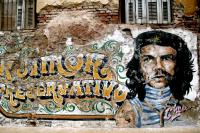 It’s Friday afternoon at the Al-Ahmad mosque in lower Buenos Aires. Despite gathering here with their multicultural brethren for prayer service, the small group of African men walking out the door is part of an inchoate community that has become a bit of a talking point in this vast and diverse metropolis.
It’s Friday afternoon at the Al-Ahmad mosque in lower Buenos Aires. Despite gathering here with their multicultural brethren for prayer service, the small group of African men walking out the door is part of an inchoate community that has become a bit of a talking point in this vast and diverse metropolis.
08.06.2012 | by P.J. Marcellino
 You will find here the account of a series of journeys which I began in August 2010. You will also find in the text and drawings of Right After the Comma other earlier and later journeys which are not restricted by it and which will orbit and “de-temporalise” its central course.
You will find here the account of a series of journeys which I began in August 2010. You will also find in the text and drawings of Right After the Comma other earlier and later journeys which are not restricted by it and which will orbit and “de-temporalise” its central course.
07.05.2012 | by Mattia Denisse
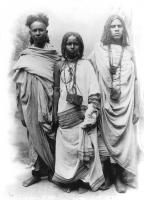 Nomads can be understood in different contexts, as in an anthropological sense, nomads as a new concept in philosophy and nomads as a real and metaphorical concept for new artistic praxis both in real and metaphorical senses. The real sense refers to art among nomadic people, while the metaphorical usage pertains to the use of nomadism in new artistic and theatrical creations.
Nomads can be understood in different contexts, as in an anthropological sense, nomads as a new concept in philosophy and nomads as a real and metaphorical concept for new artistic praxis both in real and metaphorical senses. The real sense refers to art among nomadic people, while the metaphorical usage pertains to the use of nomadism in new artistic and theatrical creations.
20.12.2011 | by Knut OveArntzen
 For the most part, prevailing definitions of gender in African studies have come from disciplines located within the Western body of knowledge. Scholars are often unaware how much these definitions are steeped in the mores and norms of the Judeo-Christian tradition, and the social conventions of European and European American cultures.
For the most part, prevailing definitions of gender in African studies have come from disciplines located within the Western body of knowledge. Scholars are often unaware how much these definitions are steeped in the mores and norms of the Judeo-Christian tradition, and the social conventions of European and European American cultures.
01.11.2011 | by Nkiru Nzegwu
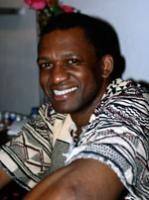 My concern is not to say who is and who is not Angolan. In Angola, as in any modern society, being Angolan is defined by the nationality law. Portugal began to nationalize all the native of colonies during the colonial war. Denationalizing them was among the first political acts of the government resulted from the 25th of April.
My concern is not to say who is and who is not Angolan. In Angola, as in any modern society, being Angolan is defined by the nationality law. Portugal began to nationalize all the native of colonies during the colonial war. Denationalizing them was among the first political acts of the government resulted from the 25th of April.
09.10.2011 | by António Tomás
 The solo exhibition ‘Monuments in Reverse’ gathers for the first time a set of works by Ângela Ferreira, made between 2008 and 2012, which emerged from the same research-based processes, giving rise, however, to disparate installations whose intimate relationships tend to remain unexplored from a curatorial perspective. With the aim of opening a space of visibility for the conceptual and formal interstices sustaining her practice in general and these works in particular, the exhibition is purposefully documentary and process-based. It intends to shed light on thinking processes more than points of arrival, through the possibility of new connections, or the visibility of previously occluded ones, the strong presence of drawing and video, and the dialogue with works by others which have constituted point of departure or inspiration.
The solo exhibition ‘Monuments in Reverse’ gathers for the first time a set of works by Ângela Ferreira, made between 2008 and 2012, which emerged from the same research-based processes, giving rise, however, to disparate installations whose intimate relationships tend to remain unexplored from a curatorial perspective. With the aim of opening a space of visibility for the conceptual and formal interstices sustaining her practice in general and these works in particular, the exhibition is purposefully documentary and process-based. It intends to shed light on thinking processes more than points of arrival, through the possibility of new connections, or the visibility of previously occluded ones, the strong presence of drawing and video, and the dialogue with works by others which have constituted point of departure or inspiration.  We know that racism is the social, cultural and political result of eurocentrism, which created the need to mark, distinguish and separate racialized ethnic groups of the human community, on the basis of skin color and/or culture. The main leverage associated with this dehumanizing enterprise of racialized ethnic groups was set on the power to construct myths that have always justified racism. In that regard, far from constituting a mere repository of unconscious and harmless prejudices, as it is often made believe, the analysis of the political situation, with the strengthening of fascism and the rise of the far right in Europe, demonstrates that racism remains at the junction of contemporary institutional political practices and the slavocratic, imperial and colonial ideologies.
We know that racism is the social, cultural and political result of eurocentrism, which created the need to mark, distinguish and separate racialized ethnic groups of the human community, on the basis of skin color and/or culture. The main leverage associated with this dehumanizing enterprise of racialized ethnic groups was set on the power to construct myths that have always justified racism. In that regard, far from constituting a mere repository of unconscious and harmless prejudices, as it is often made believe, the analysis of the political situation, with the strengthening of fascism and the rise of the far right in Europe, demonstrates that racism remains at the junction of contemporary institutional political practices and the slavocratic, imperial and colonial ideologies.  Breyten Breytenbach is a distinguished poet, painter, novelist, playwright, essayist and human rights activist. He is considered one of the greatest living poets in Afrikaans. His literary work has been translated into many languages and he has been honoured with numerous literary and art awards. Having exhibited worldwide he is also a recognized painter, portraying surreal imagery. He was born on 16 September 1939 in Bonnievale and studied art at the Michaelis Art School in Cape Town.
Breyten Breytenbach is a distinguished poet, painter, novelist, playwright, essayist and human rights activist. He is considered one of the greatest living poets in Afrikaans. His literary work has been translated into many languages and he has been honoured with numerous literary and art awards. Having exhibited worldwide he is also a recognized painter, portraying surreal imagery. He was born on 16 September 1939 in Bonnievale and studied art at the Michaelis Art School in Cape Town.  He dares refer to Angola as ‘pretty much terra incognita’ and even as a country in ‘isolation’. These descriptions are unfathomable when you consider even a basic historical listing that might take in the arrival of the Portuguese in the fifteenth century, the onward creep of Christianity, the trans-Atlantic slave trade, Portuguese colonialism, the proxy Cold War, the international oil and diamond industries, and more recently the influx of the Chinese, not to mention Angola’s major financial investments in Portugal and the explosion of kuduro music across the globe. Even at the micro level, there are plenty of Angolans who live in Luanda’s musseques, but travel across the globe to buy clothes, soft furnishings and mobile phones to sell back home. Isolated? I think not. Unknown to parochial North Americans? No doubt.
He dares refer to Angola as ‘pretty much terra incognita’ and even as a country in ‘isolation’. These descriptions are unfathomable when you consider even a basic historical listing that might take in the arrival of the Portuguese in the fifteenth century, the onward creep of Christianity, the trans-Atlantic slave trade, Portuguese colonialism, the proxy Cold War, the international oil and diamond industries, and more recently the influx of the Chinese, not to mention Angola’s major financial investments in Portugal and the explosion of kuduro music across the globe. Even at the micro level, there are plenty of Angolans who live in Luanda’s musseques, but travel across the globe to buy clothes, soft furnishings and mobile phones to sell back home. Isolated? I think not. Unknown to parochial North Americans? No doubt.  I will begin by reviewing two contrastive approaches in the anthropological and neighboring literatures on Latin America: the postcolonial and the multiple modernities perspectives. It then discusses the possible place(s) of Brazilian classic nation-building literature in these debates, putting forth an argument for the need for substantial historical embedding when addressing the postcolonial in relation to Brazil. It concludes with remarks based on ongoing ethnographic research about contemporary South-South cooperation between Brazil and the African continent.
I will begin by reviewing two contrastive approaches in the anthropological and neighboring literatures on Latin America: the postcolonial and the multiple modernities perspectives. It then discusses the possible place(s) of Brazilian classic nation-building literature in these debates, putting forth an argument for the need for substantial historical embedding when addressing the postcolonial in relation to Brazil. It concludes with remarks based on ongoing ethnographic research about contemporary South-South cooperation between Brazil and the African continent.  Latin American intellectuals have been in the forefront of doing mestiçage, métissage, Anthropophagy. While we certainly consider ourselves as part of Postcolonial theory, we have also critiqued certain of its aspects, for example the ahistorical, uncritical celebration of hybridity discourse. We were asking: “What are the genealogies of such discourses?” We prefer to emphasize the question of “linked analogies” between and across national borders. So for us, cross-border analysis becomes really crucial. It is not reducible to nation-state formations.
Latin American intellectuals have been in the forefront of doing mestiçage, métissage, Anthropophagy. While we certainly consider ourselves as part of Postcolonial theory, we have also critiqued certain of its aspects, for example the ahistorical, uncritical celebration of hybridity discourse. We were asking: “What are the genealogies of such discourses?” We prefer to emphasize the question of “linked analogies” between and across national borders. So for us, cross-border analysis becomes really crucial. It is not reducible to nation-state formations.  I read with attention the news of the arrival of more and more emigrants to the "shores of Europe" (which should their Europe be? In which window would they have drawn it in backlight?); I realize their presence in this Europe I live in, I feel the law enforcement and the construction of detention camps to accommodate them, society changing with their presence, my presence changing with their presence, Lisbon becoming a European capital, me becoming a Europe I don't want to be.
I read with attention the news of the arrival of more and more emigrants to the "shores of Europe" (which should their Europe be? In which window would they have drawn it in backlight?); I realize their presence in this Europe I live in, I feel the law enforcement and the construction of detention camps to accommodate them, society changing with their presence, my presence changing with their presence, Lisbon becoming a European capital, me becoming a Europe I don't want to be.
 We asked an albino guy if he could tell any jokes about the Portuguese, he laughed and said, a Portuguese man arrived here in Maputo, couldn’t believe his eyes, and asked a smart and friendly looking native what they called motherfuckers in Mozambique. But sir, we don’t call them, they come from Lisbon of their own accord. And there we were, two motherfuckers in Maputo, 38 years after independence and 20 years after the civil war, the old drunk woman shouting, her eyes irradiating blood and misery, give me a mulatto, give me a mulatto or money, motherfucker.
We asked an albino guy if he could tell any jokes about the Portuguese, he laughed and said, a Portuguese man arrived here in Maputo, couldn’t believe his eyes, and asked a smart and friendly looking native what they called motherfuckers in Mozambique. But sir, we don’t call them, they come from Lisbon of their own accord. And there we were, two motherfuckers in Maputo, 38 years after independence and 20 years after the civil war, the old drunk woman shouting, her eyes irradiating blood and misery, give me a mulatto, give me a mulatto or money, motherfucker.  When an "illegal" manage to reach Ceuta, he has to go to the police station. There, he is recorded as having no papers, and it’s left to local authorities to decide what to do with him: it can vary between deportation and receiving a provisional document, which allows the individual to move into the European territory (without, however, having documents allowing him to sign an employment contract). At the door of the police stations, Civil Guard elements often prevent the immigrants to submit to the authorities, handing them to Moroccan militaries.
When an "illegal" manage to reach Ceuta, he has to go to the police station. There, he is recorded as having no papers, and it’s left to local authorities to decide what to do with him: it can vary between deportation and receiving a provisional document, which allows the individual to move into the European territory (without, however, having documents allowing him to sign an employment contract). At the door of the police stations, Civil Guard elements often prevent the immigrants to submit to the authorities, handing them to Moroccan militaries.  The question is rather something else: What about other thinkers who operate outside this European philosophical pedigree, whether they practice their thinking in the European languages they have colonially inherited or else in their own mother tongues - in Asia, in Africa, in Latin America, thinkers that have actually earned the dignity of a name, and perhaps even the pedigree of a "public intellectual" not too dissimilar to Hannah Arendt, Jean-Paul Sartre, and Michel Foucault that in this piece on Al Jazeera are offered as predecessors of Zizek?
The question is rather something else: What about other thinkers who operate outside this European philosophical pedigree, whether they practice their thinking in the European languages they have colonially inherited or else in their own mother tongues - in Asia, in Africa, in Latin America, thinkers that have actually earned the dignity of a name, and perhaps even the pedigree of a "public intellectual" not too dissimilar to Hannah Arendt, Jean-Paul Sartre, and Michel Foucault that in this piece on Al Jazeera are offered as predecessors of Zizek?  The "resource curse" is a term used to characterize the risks faced by poor countries where natural resources that are object of international greed are discovered. The promise of abundance arising from the enormous commercial value of resources and from the investments required to achieve it is so convincing that it starts to influence the pattern of economic, social, political, and cultural development.
The "resource curse" is a term used to characterize the risks faced by poor countries where natural resources that are object of international greed are discovered. The promise of abundance arising from the enormous commercial value of resources and from the investments required to achieve it is so convincing that it starts to influence the pattern of economic, social, political, and cultural development.  Thus, far from being characteristic of colonial continuities before former European colonies - or what the Peruvian Anibal Quijano (1992) dubbed coloniality of power and knowledge, we are witnessing an Israeli colonialism that, contrary to what is preached is not based on defense and state security before the neighbors and "enemies" in Arabic or enlargement of its territory, but the regional dominance of a natural resource more precious than oil and that can feed the emergence of new colonial regimes in XXI Century: Water.
Thus, far from being characteristic of colonial continuities before former European colonies - or what the Peruvian Anibal Quijano (1992) dubbed coloniality of power and knowledge, we are witnessing an Israeli colonialism that, contrary to what is preached is not based on defense and state security before the neighbors and "enemies" in Arabic or enlargement of its territory, but the regional dominance of a natural resource more precious than oil and that can feed the emergence of new colonial regimes in XXI Century: Water.  Thinking about the body is a strategic requirement, a way to discuss the normative processes of exclusion, naturalization and production, setting new ways to be in the world, new affections, to expand the horizon of the reasoning about the body. The idea is to insist less in the identity politics nor the identity pretensions (and its deceiver subversion) and more on precariousness and the way it deals with difference as well as the way the maps of power are exploited.
Thinking about the body is a strategic requirement, a way to discuss the normative processes of exclusion, naturalization and production, setting new ways to be in the world, new affections, to expand the horizon of the reasoning about the body. The idea is to insist less in the identity politics nor the identity pretensions (and its deceiver subversion) and more on precariousness and the way it deals with difference as well as the way the maps of power are exploited.  The African continent for a long time was totally overlooked in the annals of the history of photography. Indeed, Africa only appeared timidly on the international horizon or rather to arouse certain interest in the West around the early 1990s. Among other important events of the time that contributed towards this growing interest figures the African Photography Biennial in Mali, also known as the African Encounters of Photography. It was precisely that framework that gave rise to this collection that wishes to concentrate on the gaze of some of the women participating in the biennial. Our collection has two main objectives: firstly, to forestage African photography on the global scenario, in other words, to make it part of the whole and not merely consider it as part of the rest; and, secondly, to act out the will to endow African women photographers more visibility. This collection aims to break down the barriers of this double invisibility by looking at the narrative constructs of these women and thus multiplying the existing ways of seeing in an attempt to broaden and enhance our own perspectives.
The African continent for a long time was totally overlooked in the annals of the history of photography. Indeed, Africa only appeared timidly on the international horizon or rather to arouse certain interest in the West around the early 1990s. Among other important events of the time that contributed towards this growing interest figures the African Photography Biennial in Mali, also known as the African Encounters of Photography. It was precisely that framework that gave rise to this collection that wishes to concentrate on the gaze of some of the women participating in the biennial. Our collection has two main objectives: firstly, to forestage African photography on the global scenario, in other words, to make it part of the whole and not merely consider it as part of the rest; and, secondly, to act out the will to endow African women photographers more visibility. This collection aims to break down the barriers of this double invisibility by looking at the narrative constructs of these women and thus multiplying the existing ways of seeing in an attempt to broaden and enhance our own perspectives.  The creole, as a language, arose from the communication needs of colonized societies with the colonizer regime, being the language of national unity in many countries. Considering their own mother tongues as little useful, colonized societies recurred to the linguistic knowledge of the imposed model to build a simpler form of vehicular language, which we nowadays call creole.
The creole, as a language, arose from the communication needs of colonized societies with the colonizer regime, being the language of national unity in many countries. Considering their own mother tongues as little useful, colonized societies recurred to the linguistic knowledge of the imposed model to build a simpler form of vehicular language, which we nowadays call creole.  It’s Friday afternoon at the Al-Ahmad mosque in lower Buenos Aires. Despite gathering here with their multicultural brethren for prayer service, the small group of African men walking out the door is part of an inchoate community that has become a bit of a talking point in this vast and diverse metropolis.
It’s Friday afternoon at the Al-Ahmad mosque in lower Buenos Aires. Despite gathering here with their multicultural brethren for prayer service, the small group of African men walking out the door is part of an inchoate community that has become a bit of a talking point in this vast and diverse metropolis.  You will find here the account of a series of journeys which I began in August 2010. You will also find in the text and drawings of Right After the Comma other earlier and later journeys which are not restricted by it and which will orbit and “de-temporalise” its central course.
You will find here the account of a series of journeys which I began in August 2010. You will also find in the text and drawings of Right After the Comma other earlier and later journeys which are not restricted by it and which will orbit and “de-temporalise” its central course.  Nomads can be understood in different contexts, as in an anthropological sense, nomads as a new concept in philosophy and nomads as a real and metaphorical concept for new artistic praxis both in real and metaphorical senses. The real sense refers to art among nomadic people, while the metaphorical usage pertains to the use of nomadism in new artistic and theatrical creations.
Nomads can be understood in different contexts, as in an anthropological sense, nomads as a new concept in philosophy and nomads as a real and metaphorical concept for new artistic praxis both in real and metaphorical senses. The real sense refers to art among nomadic people, while the metaphorical usage pertains to the use of nomadism in new artistic and theatrical creations.  For the most part, prevailing definitions of gender in African studies have come from disciplines located within the Western body of knowledge. Scholars are often unaware how much these definitions are steeped in the mores and norms of the Judeo-Christian tradition, and the social conventions of European and European American cultures.
For the most part, prevailing definitions of gender in African studies have come from disciplines located within the Western body of knowledge. Scholars are often unaware how much these definitions are steeped in the mores and norms of the Judeo-Christian tradition, and the social conventions of European and European American cultures.  My concern is not to say who is and who is not Angolan. In Angola, as in any modern society, being Angolan is defined by the nationality law. Portugal began to nationalize all the native of colonies during the colonial war. Denationalizing them was among the first political acts of the government resulted from the 25th of April.
My concern is not to say who is and who is not Angolan. In Angola, as in any modern society, being Angolan is defined by the nationality law. Portugal began to nationalize all the native of colonies during the colonial war. Denationalizing them was among the first political acts of the government resulted from the 25th of April. 
